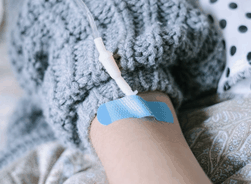Chemotherapy

Category: Medical Severity: Moderate
Description
Some cancer treatments can increase uric acid levels in the body, potentially triggering gout attacks or exacerbating existing gout. Chemotherapy, particularly treatments that cause rapid cell death, can lead to tumor lysis syndrome (TLS), a condition characterized by the release of cellular contents, including purines, into the bloodstream. This sudden influx of purines can overwhelm the body's ability to excrete uric acid, leading to hyperuricemia and potentially gout. Additionally, some chemotherapy drugs may directly affect uric acid metabolism or excretion. Dehydration, a common side effect of chemotherapy, can further concentrate uric acid in the blood. A study published in the Journal of Clinical Oncology found that certain chemotherapy regimens were associated with an increased risk of TLS and subsequent hyperuricemia [1]. Another review in Therapeutic Advances in Medical Oncology highlighted the importance of monitoring and managing uric acid levels in cancer patients undergoing chemotherapy [2]. Preventive strategies, such as hydration and the use of uric acid-lowering medications, are often employed in high-risk patients undergoing chemotherapy.